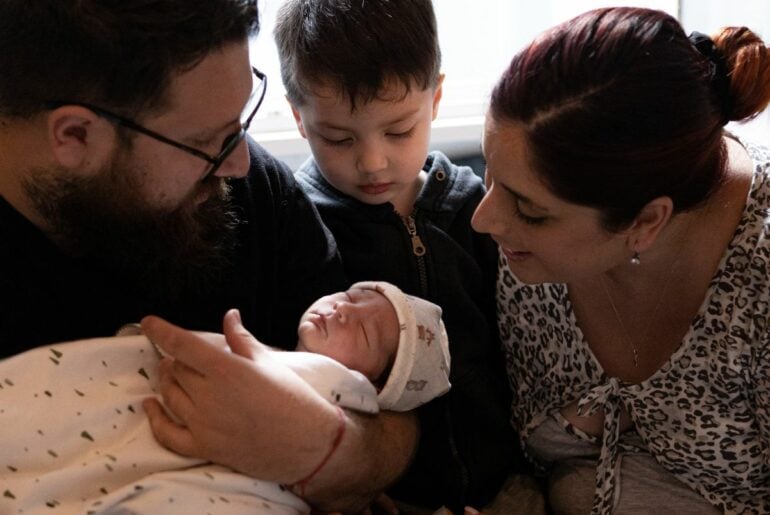Adding a new little sibling to the family can be a very exciting — and VERY challenging — time for all! Especially for your older kid(s), it can be just about the biggest transition of their lives.
From regression to anger to outright disinterest, older siblings can have a host of (perfectly healthy) reactions to their new brother or sister. And that can be rough on parents too, especially when you’re adjusting to a new addition (and going back to a baby schedule) at the same time.
Knowing what to say to ease the transition can help. Feel free to modify this script to help prepare your older children for the reality of what’s about to happen!
Go down memory lane (and be real about it)
“Let’s look at some photos and things from when you became part of our family. It was a very big event in our lives!
Your eyes were closed most of the time and you couldn’t see much yet. This is what your umbilical cord looked like before it fell off. We had to be very careful with you because new babies have soft, delicate heads and they can’t hold them up on their own yet.
We snuggled you for many hours a day because that’s what babies need most and because we just loved it so much. We fed you milk about 10 or 12 times a day, even during the night, because your stomach was so tiny. You didn’t sleep much during the nighttime for many months, so we were pretty tired!
Do you have any other questions about new babies? We can look for books about it too.”
Prepare for different feelings/reactions
“You might feel frustrated sometimes that we are giving your baby sibling so much attention, or disappointed that she can’t play with you or understand you yet. You might feel excited one day, and sad the next day.
It’s OK to have any of those feelings, and you can always tell me about them.
Let’s also remember that our new baby is going to have a lot of feelings too, like being scared to live in a new place, being hungry and tired a lot, or just not knowing how to ask for help yet! We will all need to learn more about our new baby, because we don’t know her yet.”
Emphasize togetherness and love
“It’s going to be a big change in our family, and that can be hard — but also very special because we’re doing it together.
Just remember that we always always love you, but there’s also plenty of room for more love!
Some people feel that new love right away when they meet a baby or even before they meet the baby, and for some people it takes a little longer for that love to grow. And that’s OK!
Is there anything you want to ask about that?”
Make plans to keep them occupied
“Our baby is going to spend a lot of time napping, being fed, and getting their diaper changed. So we’re going to need to stay home a lot during those first few weeks and months after our new baby arrives.
You can choose to be my helper, if you’re interested in that. You can even start now!
But let’s think of other choices for you to have when I’m too busy to play or we need to be quiet. Want to help put together a box of quiet toys for you, with books, stuffed animals, crayons, and blocks?
Are there any projects you want to start soon, like making that new card game or decorating your doll house? We can get some materials now so you’re ready to go.
Is there anyone you would like to plan some play dates with?”
Here are some additional general tips for making the transition smoother:
Before the new sibling arrives
- Refer to them as “our new baby” or “your new sibling” to foster a sense of involvement.
- Ask friends, family, and caregivers if they’ll be available to spend quality time playing and talking with the older kid(s) after the little one arrives.
When the new sibling arrives
- When the older one first meets the new addition, be sure that the baby is in a car seat or bassinet or even the hospital nursery, not in a parent’s arms.
- Spend a few minutes catching up with the older child first, and let them approach the baby when ready.
After the new sibling arrives
- Don’t be surprised by some regression and behavioral issues, no matter how well you’ve prepared!
- Try to see things from the older siblings’ point of view — imagine if your partner brought home a new, very needy best friend that you suddenly had to live with 24/7.
- Carve out 20 minutes of quality one-on-one time every day with each child.







